Blockchain
Blockchain Association sues SEC over “Dealer” De …

The Blockchain Association has filed a lawsuit against the U.S. Securities and Exchange Commission (SEC) concerning its recent reinterpretation of the “dealer” definition, which now extends to the decentralized finance (DeFi) participants.
This move has sparked a significant debate within the crypto community about regulatory reach and innovation impact.
The Blockchain Association vs. SEC: A Landmark Legal Battle
The Blockchain Association has filed a pivotal lawsuit against the SEC, focusing on the controversial expansion of the “dealer” definition to include DeFi actors.
This legal challenge raises critical questions about regulatory boundaries and the future of decentralized finance.
Background of the SEC Decision
In February 2024, the SEC broadened the “dealer” definition under securities regulations to include entities frequently trading, creating liquidity, and adjusting market conditions, which are key activities in decentralized finance (DeFi).
This adjustment was made to cover roles in the evolving digital asset markets that the old definition failed to encompass, aiming to enhance transparency and safety. However, this expansion faced opposition from the crypto industry and some SEC commissioners, who argued it could overly burden innovative sectors and hinder technological progress.
Despite these concerns, the SEC maintains that the change aligns with Congressional goals to regulate market makers and close regulatory loopholes, thus protecting market integrity and investors.
This backdrop informs ongoing legal debates and industry reactions to the SEC’s revised dealer definition.
Arguments presented by the Blockchain Association
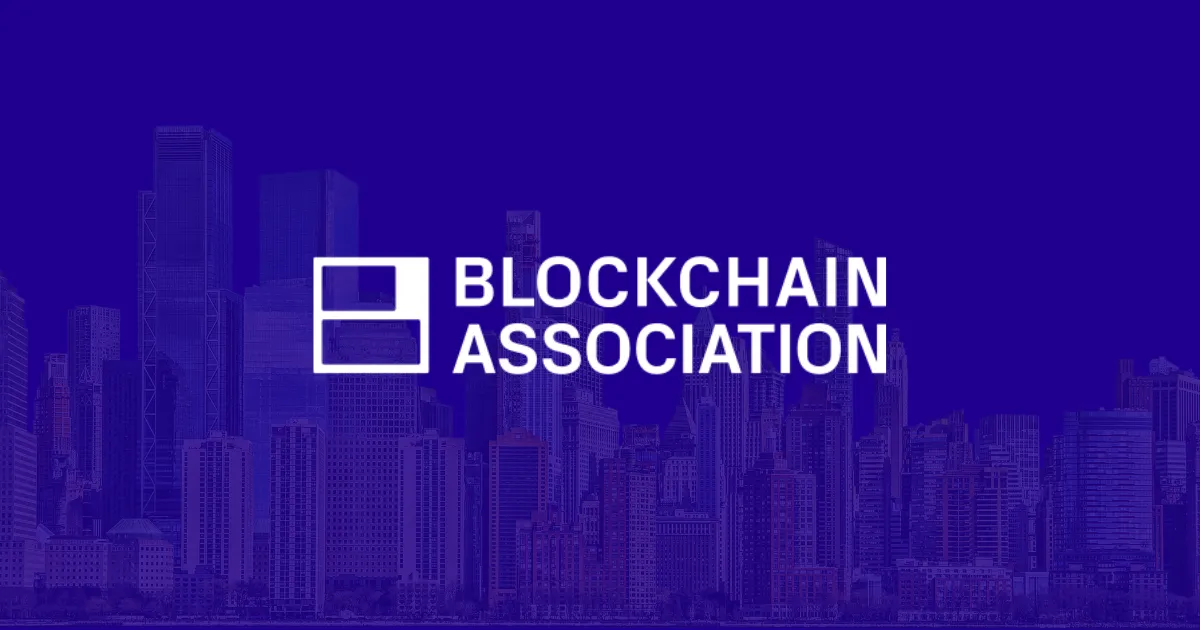
A key challenge to regulatory overreach in the DeFi field is the Blockchain Association’s lawsuit against the SEC’s expanded definition of “dealer.”
Their key point is that the SEC’s broader definition has the potential to hinder innovation by putting standard securities law frameworks on decentralized financial systems, which are meant to operate differently from traditional financial markets.
The Association contends that the SEC’s decision lacks sufficient clarity and could indiscriminately classify many DeFi participants as dealers, even those who do not engage in typical “dealer” activities like market making.
This could force many projects to either alter their operational models or cease operations due to the heightened regulatory and compliance costs.
Furthermore, the Blockchain Association argues that the SEC’s rule change was implemented without adequate industry consultation, suggesting that the regulatory process may have overlooked the unique characteristics and technological underpinnings of DeFi platforms.
They stress that extensive industry engagement to comprehend the ramifications and practical realities of DeFi ecosystems should come before enacting such regulatory measures.
Legal experts and industry stakeholders are closely watching this case, as it could set a precedent for how decentralized digital asset markets are regulated in the United States and potentially globally.
The outcome could influence future regulatory approaches to emerging technologies and either validate the SEC’s stance on stricter regulations or push back against what some see as an overextension of regulatory authority in the rapidly evolving crypto sector.
The SEC’s stance over the dealer definition
To strengthen regulatory control and lower possible risks in the financial markets, especially those related to DeFi and other digital assets, the Securities and Exchange Commission (SEC) decided to redefine “dealer” under securities legislation.
SEC Chair Gary Gensler emphasized that the updated rules are common-sense measures intended to protect market integrity and ensure that all market participants adhere to the same standards.
These measures may affect individuals who operate in these categories but do not identify as dealers in the DeFi market.
The SEC argues that these changes are necessary to close regulatory gaps that have allowed some market participants to operate without adequate oversight, which could lead to unfair market practices and financial instability.
The agency also pointed out that the redefinition follows a functional analysis approach, focusing on the activities undertaken by a person rather than the type of security traded.
This approach aims to ensure that anyone engaging in market-making activities, directly or indirectly, is subject to registration and regulation, irrespective of the technology used.
Implications for the Crypto Market, Regulation and Expert Perspective
The SEC’s move has significant implications for the crypto market, particularly within the DeFi sector.
By requiring more entities to register as dealers, the rule aims to bring greater transparency and oversight to this dynamic sector.
However, this could also mean increased compliance costs and operational challenges for DeFi platforms, potentially stifling innovation and impacting smaller players who may not have the resources to meet these new regulatory demands.
Additionally, this move signals a broader trend towards tighter regulation in the crypto industry, reflecting growing governmental interest in ensuring market stability and protecting investors from potential risks associated with digital assets.
While this might enhance investor confidence and market integrity, it raises concerns about the balance between regulation and the autonomy of decentralized systems.
Expert Opinions
The ongoing legal challenge by the Blockchain Association against the SEC’s expanded “dealer” definition has garnered attention and varying opinions from legal experts and industry leaders. Their insights shed light on potential outcomes and the broader impacts of this regulatory shift on the crypto landscape.
Legal Perspective:
- Gary Gensler, SEC Chair, mentioned that the changes are common-sense measures intended to maintain market integrity. He stressed the importance of these rules in protecting investors from emerging risks associated with digital assets.
- Mark Uyeda, the Republican SEC Commissioner, criticized the rule change as overreach, expressing concerns about the expansive interpretation of the “dealer” definition, which could limit industry growth and innovation.
Industry Insight:
- Crypto Analysts suggest that the increased regulatory scrutiny could lead to more stable market conditions, which might attract institutional investors seeking reliability and compliance assurances. However, they also warn that such stringent measures could deter new entrants and suppress technological innovations within the sector.
The outcome of this lawsuit could influence regulatory approaches globally, impacting not just the U.S. markets but also international standards on cryptocurrency operations.
Blockchain
5 Reasons Why Delta Exchange is the Easiest Platform for Crypto Trading Strategies in the Indian Market

Crypto trading in India has grown exponentially in the last few years. In 2025, the market pulled in $258 million in revenue and is on track to hit nearly $732 million by 2033, growing at a 14.3% CAGR from 2026 onwards. That kind of money doesn’t come from people buying Bitcoin on a whim and hoping for a lucky spike. It comes from traders who plan entries, manage exits, build hedges, and run full-blown crypto trading setups.
This shift has created a new problem. Most Indian crypto exchange apps still feel built for basic spot buying without any advanced features to try. You open five tabs, check prices on one app, place orders on another, track risk on a third, and hope nothing slips through.
Delta Exchange transforms the story here. Instead of spots, Delta offers a safe trading platform to explore crypto derivatives (futures and options) across major currencies.
Let’s understand more about Delta Exchange and why so many Indian traders end up sticking with it once they try it.
Why Try Crypto Trading Strategies on Delta Exchange
Ranked among the top Indian crypto exchanges, Delta Exchange offers a range of features and analytics tools to simplify your crypto trading experience.
Here’s why many traders trust Delta Exchange:
- INR trading keeps things simple
If you’ve ever had to convert INR to USDT or USD just to trade Bitcoin, you know the hassle. Delta Exchange lets you deposit and withdraw in INR directly via UPI, IMPS, NEFT, and bank transfer, with your margin and profits shown in INR.
That means no awkward crypto conversions or extra wallets – you fund your account straight from your bank and start crypto trading like it’s normal money.
- Algo trading bots that actually work
Automation can save hours and reduce emotional stress and decisions, especially with fast moves in crypto F&O. Delta Exchange supports algo trading through APIs and bot integrations from platforms like TradingView and Tradetron.
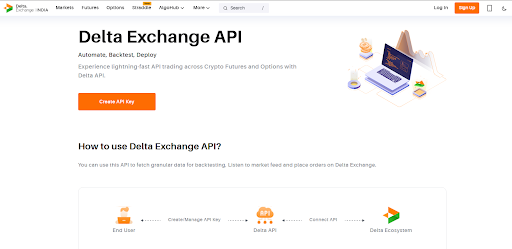
You can link your trading strategy to webhooks or APIs and let bots place trades for Bitcoin futures or other crypto options even when you’re away. If you want systematic, repeatable strategies with fewer missed opportunities, this setup feels practical and real.
And the best part? You don’t need to have any coding knowledge or degree – API Copilot does it all for you.
- Lower trading fees that don’t eat into your wins
Fees matter because every percentage point you pay is one less in your pocket after a winning trade. Delta Exchange offers competitive taker and maker fees, plus a fee cap on options that limits how much you pay on low premium trades.
This helps keep costs predictable, whether you’re trading Bitcoin or ETH futures and options. Traders who place frequent trades or use multi-leg strategies on the Indian crypto exchange can keep more of their gains, rather than having them eaten up by trading fees.
- Strategy Builder for practical trading plans
Strategy planning can get messy if the platform doesn’t help you visualize outcomes. Delta Exchange offers tools that let you craft crypto F&O setups with clear strike choices and expiries, plus daily, weekly, and monthly options for more precise timing. This helps you conveniently plan spreads, straddles, or hedges.
- Compliance and risk measures to know
It’s one thing to trade, another to trust the platform doing it. Delta Exchange is registered with India’s Financial Intelligence Unit (FIU) and follows local KYC and AML rules.
For risk management, the platform supports:
- Margin controls and stop-loss tools that help you manage positions while you trade Bitcoin or other crypto derivatives.
- Demo account to practice trades and understand the market without real money.
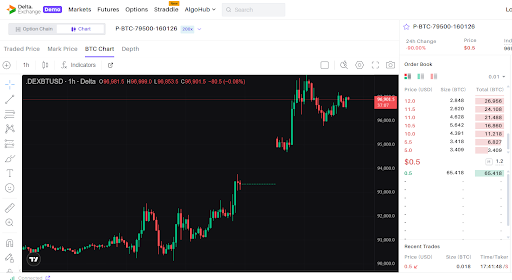
- Payoff charts show you how your trade will play out with breakeven points and maximum P&L.
This way, you can study your crypto trading strategy better before finalizing the trade.
Apart from these, Delta also offers leverage up to 200X – a good way to amplify your profits if the market moves in your favor.
The Bottomline
Indian crypto traders have moved far past the buy-and-hold phase. Spot crypto trading still has its place, yet most active users now want faster ways to make money from price swings, not wait months for a rally.
That’s where crypto F&O, spreads, and short-term setups step in. You want tools that let you react within minutes, control risk, and lock gains when the move shows up.
Platforms that only support basic coin buying just can’t keep up with that style of trading. Serious traders want flexibility, speed, and ways to work with volatility, not sit through it – and Delta Exchange caters to such traders well.
Disclaimer: Crypto trading carries inherent risks due to its high volatility. This article is for informational purposes only. Kindly do your own research before making any investment decisions.
Blockchain
MoonExe Aligns With the Next Phase of Stablecoin Payments as Global Regulation Accelerates

MoonExe today reaffirmed its strategic focus on stablecoin-powered payment infrastructure as global regulatory clarity continues to accelerate across major financial jurisdictions.
Regulators worldwide are advancing frameworks that formally recognize stablecoins as legitimate instruments for payment, settlement, and treasury operations. Legislative initiatives in the United States, expanded licensing regimes in Asia, and structured compliance approaches in other regions are collectively signaling a transition from experimental adoption to regulated, real-world deployment.
As stablecoins move deeper into mainstream financial infrastructure, demand is increasing for platforms capable of delivering real-time liquidity, transparent pricing, and verifiable settlement. MoonExe’s Exchange Finance (ExFi) model is designed to address these needs by enabling stablecoin-based currency conversions that operate continuously, without dependence on traditional banking cut-off times or geographic limitations.
The platform focuses on facilitating efficient value movement while maintaining transparency through public blockchain records. Transactions executed within the MoonExe ecosystem can be independently verified via standard blockchain explorers, reinforcing confidence through auditable, immutable data.
In parallel with regulatory progress, market participants are increasingly prioritizing infrastructure reliability over speculative activity. Stablecoins are being evaluated less as alternative assets and more as operational tools capable of supporting cross-border payments, digital commerce, and treasury flows.
MoonExe continues to expand its infrastructure and partnerships to support this evolution, positioning itself as part of the foundational layer required for stablecoins to function at global scale.
For more information about MoonExe and its stablecoin payment infrastructure, visit https://moonexe.com/
Blockchain
Playmaker to Launch in Q2 2026 as Midas Labs Expands Its AI-Powered Game Creation Ecosystem

Midas Labs, a UK-based Web3 technology company, has announced the upcoming launch of Playmaker, an AI-powered game creation and launchpad platform scheduled for Q2 2026. The platform is designed to lower barriers to game development and funding, operating as a core product within the UNIFI-powered Midas ecosystem.
Playmaker will provide creators, indie studios, and early-stage visionaries with an integrated environment to ideate, build, fund, and publish games without the traditional constraints of large teams or complex technical infrastructure. By combining AI-assisted creation tools with a structured launchpad and marketplace, the platform aims to streamline the path from concept to live product.
According to Jonathan Wheatley, Chief Marketing Officer of Midas Labs, Playmaker represents a natural progression of the company’s ecosystem strategy.
“Playmaker is about enabling participation at every level — from creators and developers to early supporters and players,” said Wheatley. “By integrating AI-driven creation with funding and publishing infrastructure, we’re building a system that allows ideas to move efficiently from concept to execution.”
The platform is powered by the $PLAY token, a fixed-supply utility asset used for project participation, creator payments, marketplace transactions, and ecosystem services. $PLAY operates within the broader UNIFI ecosystem, where UNIFI serves as the access and conversion layer, reinforcing liquidity and alignment across Midas Labs’ products.
Midas Labs has structured Playmaker’s token economy around a non-mintable, scarcity-driven model, designed to support long-term sustainability as platform adoption increases.
The Playmaker launch builds on recent Midas Labs milestones, including the expansion of the Midas Play Marketplace, multiple game releases, ecosystem partnerships, and the rollout of UNIFI staking infrastructure. Together, these components form a vertically integrated environment linking creation, funding, distribution, and participation.
Playmaker is scheduled to go live in Q2 2026, with phased ecosystem access beginning with early contributors before expanding globally.
About Midas Labs
Midas Labs is a United Kingdom–based Web3 technology company focused on building scalable digital ecosystems across gaming, AI, and creator-driven platforms. Powered by the UNIFI token, Midas Labs develops infrastructure designed for long-term participation, real utility, and sustainable growth.
-

 Crypto4 years ago
Crypto4 years agoCardalonia Aiming To Become The Biggest Metaverse Project On Cardano
-
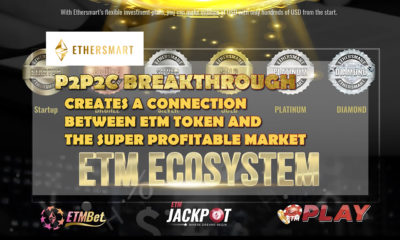
 Press Release5 years ago
Press Release5 years agoP2P2C BREAKTHROUGH CREATES A CONNECTION BETWEEN ETM TOKEN AND THE SUPER PROFITABLE MARKET
-
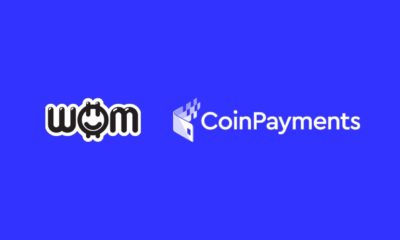
 Blockchain5 years ago
Blockchain5 years agoWOM Protocol partners with CoinPayments, the world’s largest cryptocurrency payments processor
-

 Press Release5 years ago
Press Release5 years agoETHERSMART DEVELOPER’S VISION MADE FINTECH COMPANY BECOME DUBAI’S TOP DIGITAL BANK
-

 Press Release5 years ago
Press Release5 years agoProject Quantum – Decentralised AAA Gaming
-

 Blockchain6 years ago
Blockchain6 years agoWOM Protocol Recommended by Premier Crypto Analyst as only full featured project for August
-

 Press Release5 years ago
Press Release5 years agoETHERSMART DEVELOPER’S VISION MADE FINTECH COMPANY BECOME DUBAI’S TOP DIGITAL BANK
-

 Blockchain6 years ago
Blockchain6 years ago1.5 Times More Bitcoin is purchased by Grayscale Than Daily Mined Coins






